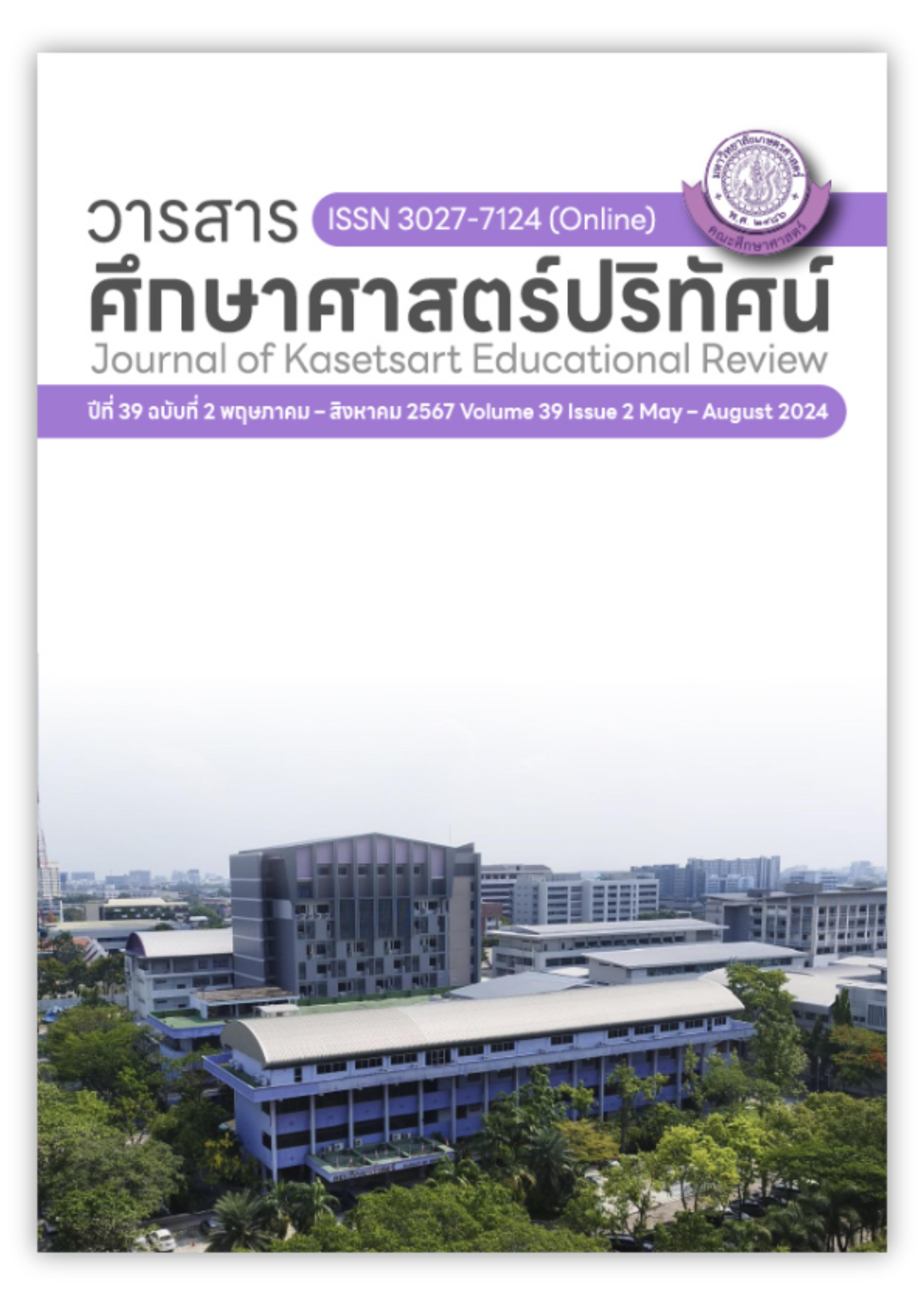บทบาทผู้ปกครองในการส่งเสริมความสามารถคิดบริหารจัดการตนของเด็กอนุบาล
คำสำคัญ:
การส่งเสริมความสามารถคิดบริหารจัดการตน, บทบาทผู้ปกครอง, เด็กอนุบาลบทคัดย่อ
การวิจัยครั้งนี้มีวัตถุประสงค์เพื่อศึกษาบทบาทผู้ปกครองในการส่งเสริมความสามารถคิดบริหารจัดการตนของเด็กอนุบาล ประกอบด้วย 2 ด้าน ได้แก่ 1) การสร้างสัมพันธภาพที่ดี และ2) การสนับสนุนการเรียนรู้ เครื่องมือในการวิจัย คือ แบบสอบถามผู้ปกครอง ตัวอย่าง คือ ผู้ปกครองของเด็กอนุบาล โรงเรียนสาธิตในสังกัดกระทรวงการอุดมศึกษา วิทยาศาสตร์ วิจัยและนวัตกรรม กรุงเทพมหานคร จำนวน 160 คน ซึ่งได้มาจากการเลือกแบบกำหนดโควตา วิเคราะห์ข้อมูล โดยการแจกแจงความถี่ หาค่าร้อยละหาค่าเฉลี่ย และส่วนเบี่ยงเบนมาตรฐาน ผลการวิจัย พบว่า ผู้ปกครองส่งเสริมความสามารถคิดบริหารจัดการตนของเด็กอนุบาลภาพรวมอยู่ในระดับมาก (M= 3.60, SD= 0.26) เมื่อพิจารณารายด้าน พบว่า 1) การสร้างสัมพันธภาพที่ดี อยู่ในระดับมาก (M= 3.60, SD= 0.26) โดยองค์ประกอบรอง ได้แก่ การตอบสนองทางบวกต่อเด็ก (M= 3.75, SD= 0.33) และการเป็นแบบอย่างที่ดี (M= 3.45, SD= 0.36) และ 2) การสนับสนุนการเรียนรู้ อยู่ในระดับมาก (M= 3.59, SD= 0.35)
โดยองค์ประกอบรอง ได้แก่ การจัดกิจกรรมบูรณาการเพื่อฝึกการวางแผน (M= 3.73, SD= 0.40) และ การเสริมต่อการเรียนรู้ (M= 3.46, SD= 0.41)
เอกสารอ้างอิง
Butterfuss, R., & Kendeou, P. (2018). The role of executive functions in reading comprehension. Educational Psychology Review, 30(3), 801-826. https://doi.org/10.1007/s10648-017- 9422-6.
Clark, G., Niblock, J., Vos, T., Lieberman, D., & Hunter, E. (2021). Systematic review of occupational therapy interventions to enhance cognitive development in children 0–5 years: Part 1 identified diagnoses. Journal of Occupational Therapy, Schools, & Early Intervention, 14(4), 466-485. https://doi.org/10.1080/19411243.2021.195948.
Ebadirad, S., Hatfield, B., Green, B., Rennekamp, D., & the Oregon School Readiness Research Consortium. (2016). Parenting brief: What parents can do to build skills for school readiness and success. Oregon School Readiness Research Consortium. https://health.oregonstate.edu/sites/health.oregonstate. edu/files/hallie-ford/osrrc/pdf/parentingbrief_2016_11_hatfieldebadiradgreen.pdf.
Garey, R. (2023, October 12). Teaching kids how to deal with conflict. Child Mind Institute. https://childmind.org/article/teaching-kids-how-to-deal-with-conflict/.
George, D., & Mallery, P. (2003). Using SPSS for Windows Step by Step: A Simple Guide and Reference (4th ed.). Pearson Education.
Harnmetee, S. (2016). Executive Functions = EF. Rakluke Learning Group. [in Thai].
Harnmetee, S. (2018). Executive Functions from fetus - 3 years old. In Harnmetee, S., Pitaksinsuk, T., & Aramrit, P. (Eds.), Parent Handbook for developing EF from fetus - 3 years old child (pp. 61-85). Thai Health Promotion Foundation and RLG. [in Thai].
Help Me Grow. (2023). Why unstructured play is important to child development. https://helpmegrowmn.org/HMG/HelpfulRes/Articles/WhyUnstructure/index.html
Hutchinson, C. (2020, September 21). Free play and well-being. Australian Childhood Foundation. https://professionals.childhood.org.au/prosody/2020/09/free-play-and-wellbeing/.
International Health Policy Program Thailand. (2021). The report of reviewing economic and social impact from COVID-19 disease in the world and Thailand. Division of Non-Communicable Diseases. https://ddc.moph.go.th/uploads/publish/ 1177420210915075055.pdf [in Thai].
Kaemkate, W. (2008). Research methodology in behavioral sciences (2nd ed.). Chulalongkorn University.
Kannasuth, P. (1999). Statistics for research methods in behavioral sciences (3rd ed.). Darnsutha Press. [in Thai].
Kolk, S., & Rakic, P. (2022). Development of prefrontal cortex. Neuropsychopharmacology, 47(1), 41-57. https://doi.org/10.1038/s41386-021-01137-9.
Martinelli, K. (2023, October 12). The power of positive attention. Child Mind Institute. https://childmind.org/article/the-power-of-positive-attention/.
Massey, S., Turnbull, K., Justice, L., & Bowles, R. (2008). Educators’ use of cognitively challenging questions in economically disadvantaged preschool classroom contexts. Early Education and Development, 19(2), 340–360. https://doi.org/10.1080/ 10409280801964119.
Meuwissen, A., & Carlson, S. (2015). Fathers matter: The role of father parenting in preschoolers' executive function development. Journal of Experimental Child Psychology, 140, 1-15. https://doi.org/10.1016/j.jecp.2015.06.010.
Moitra, T., & Mukherjee, I. (2012). Does parenting behavior impact delinquency : A comparative study of delinquents and non-delinquents. International Journal of Criminal Justice Sciences, 5(2), 274-285.
Rangsiyanon, K., Intamra, P., Pianpiamsin, S., Wannasuth, S., & Tinnarat, S. (2019). Development of creation of executive function-EF model for preschool children through the participation process of the school under Suan Dusit University’s network. Mediterranean Journal of Social Sciences, 10(5), 13-23. https://doi.org/10.2478/mjss-2019-0062.
Thanasetkorn, P. (2018). EF and early childhood development. In Harnmetee, S., Pitaksinsuk, T., & Aramrit, P. (Eds.), Handbook of developing executive functions (EF) for early childhood teachers (pp. 61-85). Matichon. [in Thai].
Thoits, P. (2010). Stress and health: Major findings and policy implications. Journal of health and social behavior, 51(1), 41–53. https://doi.org/10.1177/0022146510383499.
Umberson, D., Pudrovska, T., & Reczek, C. (2010). Parenthood, childlessness, and well-being: A life course perspective. Journal of marriage and the family, 72(3), 612-629. https://doi.org/10.1111/j.1741-3737.2010.00721.x.
Zelazo, D. (2015). Executive function: Reflection, iterative reprocessing, complexity, and the developing brain. Developmental Review, 38(4), 612–624. https://doi.org/10.1016/j.dr.2015.07.001.
ดาวน์โหลด
เผยแพร่แล้ว
ฉบับ
ประเภทบทความ
สัญญาอนุญาต
ลิขสิทธิ์ (c) 2024 วารสารศึกษาศาสตร์ปริทัศน์

อนุญาตภายใต้เงื่อนไข Creative Commons Attribution-NonCommercial-NoDerivatives 4.0 International License.
บทความทุกบทความเป็นลิขสิทธิ์ของวารสารคณะศึกษาศาสตร์ มหาวิทยาลัยเกษตรศาสตร์ วิทยาเขตบางเขน
วารสารศึกษาศาสตร์ปริทัศน์ (Kasetsart Educational Review)






